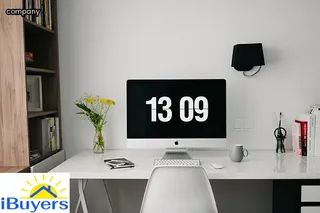Home equity is the amount of ownership that an individual has in their home. It is calculated by subtracting the total amount of debt that a homeowner has against their property from the current market value of the property.
Home equity can be accessed by selling shares of your home, also known as fractionalizing, to investors. This allows homeowners to unlock the value of their home and receive cash up front without having to sell or refinance their entire property.
Fractionalizing gives investors access to long-term investments with higher returns than traditional stock markets, while still allowing homeowners to retain control over their properties. Selling shares of your home allows you to tap into your home’s equity and use it for whatever purpose you deem most necessary.
The process is simple and straightforward, requiring minimal paperwork and no credit check, so long as all applicable laws are followed. In sum, selling shares of your home is a great way to unlock the equity you have in it and access needed funds quickly and easily.

Home equity financing can be a great option for those looking to access the value of their home without selling it. It is important to understand the potential benefits of home equity financing in order to make an informed decision about this type of loan.
Home equity financing typically has much lower interest rates than other forms of borrowing, making it more affordable for borrowers. Additionally, home equity financing provides a way for borrowers to access the cash value of their homes without having to liquidate any assets or sell their property.
Furthermore, these loans tend to have longer repayment terms than other types of loans, meaning that borrowers can spread out payments over time and may pay less over the life of the loan. Finally, home equity financing often allows homeowners to use their homes as collateral on large purchases such as cars or vacations while still maintaining ownership of their property.
Understanding these benefits can help homeowners determine if home equity financing is the best choice for them when they are considering unlocking their home's equity.
Calculating your available home equity is an important step to take when unlocking the value of your home. To begin, assess the market value of your home and subtract any mortgages or loans that are owed against it.
This will provide you with a rough estimate of the equity you possess in your property. You can also factor in any improvements that have been made to the property since purchase, such as remodeling projects, which can add additional equity.
Additionally, consider any tax deductions that could be applicable to the sale of your home, as these may reduce the cost of selling and increase available funds. Lastly, research relevant real estate trends in your area to gain a better understanding of how much you can expect from the sale of your home.
All these factors should be taken into account when calculating available home equity from selling shares of your property.

Exploring options to use HELOCs for financing is a great way to unlock your home equity and make the most of your money. Home Equity Lines of Credit (HELOCs) are a type of loan that uses the equity in your home as collateral; they offer more flexibility than other types of loans and can be used for a variety of purposes, such as debt consolidation, home improvements, or even paying for college.
By using a HELOC, you can borrow against your home's value without having to sell it or refinance your mortgage. This gives you access to large sums of cash without having to worry about selling shares of your home.
When considering taking out a HELOC, it's important to understand how they work and what the potential risks are, so you can make an informed decision that works best for you and your family. It's also important to shop around and compare rates between different lenders before making any commitments.
With proper research and planning, using a HELOC can be an effective way to unlock the equity in your home and take advantage of its value.
When it comes to unlocking the equity in your home, selling shares can be a powerful tool that allows you to take out cash while still maintaining ownership. However, there are both pros and cons associated with this strategy that should be taken into consideration before making a decision.
On the plus side, selling shares in your home can provide you with access to funds without taking on additional debt or having to go through the lengthy process of refinancing. It also gives you the ability to recoup some of your initial investment if needed.
On the downside, it can lead to higher taxes and potentially less control over your property if too many shares are sold. Additionally, there may be restrictions on how much of your home equity you're allowed to sell at one time.
Ultimately, deciding whether or not selling shares in your home is right for you requires careful thought and understanding of all associated risks and benefits.

Navigating an equity sharing agreement is a complex process, but one that can provide a valuable source of income by unlocking the home equity you have built up in your property. It is essential to understand the legal and financial implications of such agreements before entering into any contract.
Equity sharing contracts involve both seller and buyer agreeing to split the proceeds of a sale or rental of a property in return for a share of the profits; often, the buyer will take on some of the risk associated with owning real estate. The seller must also understand the implications of tax liabilities and other financial commitments that come with these agreements, as well as ensuring their rights are fully protected through contractual clauses.
To make sure you get the best out of any equity sharing agreement, it is important to seek professional advice from attorneys and financial advisors who specialize in this area. Researching applicable laws in your area will help ensure that all parties involved are properly informed about their rights and obligations under any potential contract.
Working with experienced professionals can also help you navigate tricky legal issues and find solutions tailored to your individual needs so that you can maximize your return from this unique opportunity to unlock your home equity.
Equity sharing programs offer homeowners the opportunity to monetize their property without having to sell it outright. In this arrangement, a homeowner can enter into a partnership with an investor and use the equity in their home as leverage to purchase additional property.
The investor then provides financing to purchase the new property, while the homeowner provides their existing home as collateral. This process allows the homeowner to benefit from any appreciation of the newly purchased property while retaining ownership of their existing home.
Equity sharing programs can also be used to cover additional expenses such as repairs or renovations on properties that are already owned. In this case, the homeowner will provide some of their equity as well as other assets such as cash or stocks and bonds in exchange for funds from the investor.
By entering into an equity sharing program, homeowners can access capital without needing to take out a loan or refinance their mortgage, making it an attractive option for those looking to unlock value from their homes without going through traditional sales processes.

Investing in an equity sharing agreement can be a great way to unlock the value of your home and diversify your portfolio, but it isn't without risks. Before jumping into an equity sharing agreement, it's important to consider both the potential rewards as well as the associated risks.
When investing in an equity sharing agreement, you should be aware that you may not receive a return on investment if the house does not appreciate enough or if there is a downturn in the housing market. Additionally, you should understand that the rights of both parties can vary depending on the type of arrangement and how much control each party has over decisions about repairs, maintenance, and other costs.
Furthermore, it's important to remember that while many people are attracted to this type of investment because of its potential tax benefits, these benefits may not always be realized due to fluctuations in property taxes and local regulations. While there are several risks associated with investing in an equity sharing agreement, there are also potential rewards such as increased liquidity of your finances and access to funds for home renovations or new investments.
If you do decide to enter an equity sharing agreement, be sure to weigh both the risks and rewards carefully before making any commitments.
An equity sharing agreement is a great option when you need to access the value of your home and don’t want to go through the process of selling it. It can be an especially beneficial choice if you plan to stay in your house for many years, since it allows you to maintain ownership while still freeing up some of the equity in the property.
An equity sharing agreement also allows you to unlock a large sum of money without having to take out a loan or use other forms of debt. When considering whether or not an equity sharing agreement is right for you, it is important to understand all the details and potential risks associated with the transaction.
You should also consult with an experienced financial advisor in order to determine if this type of agreement is suitable for your specific needs.

For homeowners who are underwater on their mortgages and considering foreclosure, there are other options available. Selling shares of your home equity is one way to avoid foreclosure while also releasing some of the equity tied up in your home.
Through a process known as “shared appreciation,” you can unlock some of the equity in your home without having to move out or take on additional debt. This comprehensive guide will explore the various alternatives to foreclosure that exist, enabling you to make an informed decision about which option best suits your needs.
Additionally, this guide will provide insight into how selling shares of your home equity works and how it can help you get back on track financially. With this information in hand, you will be better equipped to unlock the value in your home and move forward with confidence.
When deciding to unlock your home equity, it is important to understand and consider the costs associated with an equity sharing agreement. The most common cost of an equity sharing agreement is the fees charged by the company that you are partnering with.
These fees can vary greatly depending on the company, so it is vital to shop around for the best deal. Additionally, there will be taxes due based on any profits from selling shares of your home.
It is also important to consider how much of your equity you are willing to share and for how long. Lastly, some companies may require a minimum investment amount which could limit your ability to access certain deals.
All of these costs should be weighed carefully before entering into an equity sharing agreement in order to ensure that you get the best outcome for your situation.

When it comes to unlocking the equity of your home, there are several repayment options to consider. Homeowners can opt to make a lump sum repayment after selling shares of their home, or they can spread out payments over time.
A balloon payment is an option in which the homeowner pays a fixed amount at the end of an agreed upon term, usually five years. Alternatively, some homeowners decide to take on a line of credit with a repayment schedule based on their income and cash flow.
This method allows them to access funds when needed while keeping their monthly payments lower than if they made lump sum payments. Lastly, refinancing is another option for those who want to change the terms of their loan and lock in better interest rates.
Whatever repayment plan you choose, it's important that you understand all the risks and benefits associated with each option before making a decision.
Understanding the two primary ways of unlocking home equity can be complex, however it is important to know the differences between a HELOC (home equity line of credit) and an Equity Share Agreement. A HELOC is a loan secured by your home's equity and offers flexible repayment terms with variable interest rates.
This loan allows you to borrow up to 85% of your home’s value in cash which you can use for debt consolidation, home improvement projects or other large purchases. On the other hand, an Equity Share Agreement is a contract with an investor who pays for part ownership in your home in exchange for a lump sum payment.
This agreement differs from a HELOC as it does not require monthly payments and the investor will generally receive their full investment back when you sell your home or refinance your mortgage. It also provides more flexibility than other types of financing as you are able to customize your agreement to better fit your needs.

When it comes to unlocking your home equity and maximizing your return on investments, there are a few key strategies to consider. First, it is important to understand the current market conditions and how they can affect the value of your home equity.
Researching the local housing market and keeping up with changes in real estate trends can give you an edge when selling shares of your home equity. Additionally, finding a reputable real estate agent who has experience in selling homes in your area can be beneficial as they have an understanding of current market values.
Furthermore, it is important to look into financing options that may be available when selling shares of your home equity. Taking advantage of low-interest rates or other incentives from lenders can help you maximize your return on investment.
Finally, creating a budget for renovations or improvements before listing will help ensure that you get the best possible price for your home equity investments.
Financial professionals often advise homeowners to understand the unique benefits of unlocking their home equity. One of the main advantages is that it can provide a financial cushion for times when there is an unexpected expense or investment opportunity.
Additionally, it can be used to finance home improvements and renovations in order to increase the value of the property. Moreover, homeowners may consider using their home equity as a source of retirement income or to pay off high-interest debt.
Before taking any action, though, they should assess their individual financial situation and ensure they have enough money saved for emergencies before making any decisions about accessing home equity. It is also important to research various options and make sure you are familiar with all associated risks.
Understanding how to make informed decisions with regards to unlocking your home equity can help you make the most out of this financial tool.

With the vast amount of information available on the internet, it can be overwhelming to try and educate yourself about your home equity options. Fortunately, there are several resources that can help you unlock your home equity and make informed decisions.
Social media is an excellent platform for learning more about home equity, as it allows you to easily connect with other homeowners who have gone through the process of releasing their equity. Additionally, there are a variety of blogs, websites, and forums that offer valuable advice on unlocking home equity.
Furthermore, many lenders have dedicated webpages on their sites providing helpful information regarding the different types of loans and financing products available. Lastly, you can also contact local real estate agents or financial advisors for personalized advice tailored to your individual needs.
By utilizing these social media and other resources, you will be able to gain a better understanding of how to unlock your home equity and use it to your advantage.
Yes, you can sell shares of your house. Unlocking your home equity is a great way to access the value of your home without having to take out a loan or refinance.
Selling shares of your house is a popular way to tap into the equity in your home and use it for investments, renovations, paying off debt, or other big purchases. It's important to understand how selling shares of your house works before taking this step.
This comprehensive guide will explain the different types of home equity sharing, the process for selling shares of your house, and potential risks associated with unlocking your home equity. With this information in hand, you'll be able to make an informed decision about whether selling shares of your house is right for you.

Yes, you can sell a percentage of your home through the process of unlocking your home equity. Unlocking home equity involves taking a loan against the value of your home, which allows you to access the funds stored within it.
This is often used when someone is looking to purchase a large item or pay for renovations or other expenses. By selling a percentage of your home, you are able to release some of this locked-in equity and use the funds as needed.
It's important to note that if you sell a portion of your home then your total ownership stake in the property will decrease accordingly. Additionally, it is also important to remember that any loan taken against the value of your home may need to be repaid should you choose to move or refinance in the future.
When you sell your house, the equity you have in it is typically released and distributed to you, the homeowner. This equity can be used for a variety of purposes, such as paying off debt or investing in other real estate opportunities.
Selling your home equity can be a great way to increase liquidity and diversify your financial portfolio. However, it is important to understand how the process works so that you can make an informed decision about whether or not selling your home equity is the right choice for you.
To unlock your home equity, there are several steps you should take, including understanding how much equity you have and researching potential payment options. Additionally, contact a qualified professional who can provide guidance on the best course of action for unlocking your home equity.
A home equity share is a form of financial product that allows homeowners to access the value of their property without having to take out a loan or mortgage. By selling shares of your home, you are able to unlock the equity in your property and use it for various purposes such as paying off debts, making investments, or financing major purchases.
Depending on the type of home equity share you decide to purchase, you may receive payments over a specified period of time or in one lump sum. Once the sale is finalized and the shares are sold, the purchaser holds an ownership interest in your property.
This means that they will be entitled to any profits made from future appreciation or dividends from rental income of your property. In order to ensure that you get fair market value for your home, it is important to do research and review multiple offers before making a decision.
With this comprehensive guide, you can explore all of the options available when unlocking your home equity and make an informed decision on which share type works best for you.